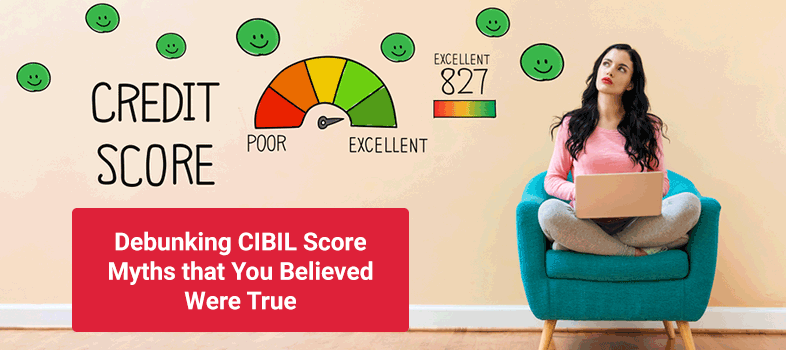When you want to be approved for the best credit cards or when you want to apply for a loan, your credit score is crucial. Because it gives financial institutions an insight of their financial situation, many people work hard to keep up a decent CIBIL score. However, there are numerous misconceptions concerning credit scores that the general public holds, and we’re going to bust them.
Myth 1: Checking CIBIL Score will Decrease Your Score
Fact: Untrue. The idea that checking your credit report will lower your score is one of the most widespread misconceptions, but this is untrue because doing so is regarded as a “soft pull.” A forceful draw affects your credit score more than a soft pull does. The process of applying for a new credit card is referred to as a hard pull.
Myth 2: Cancelling a Credit Card will Help Your Score
Fact: It doesn’t. Many people believe that cancelling credit cards they are no longer using would improve their credit score but doing so actually makes it worse. Your “credit usage ratio” is considered by credit scoring systems when determining your credit score. Your available credit limit decreases when you close a credit card, which occasionally causes the utilization ratio to increase and lower your credit score.
Myth 3: You Can’t Get a Credit Card or a Loan with Low CIBIL Score
Fact: Because CIBIL Scores are constantly changing, having a low score does not always preclude you from ever being approved for a credit card or loan. Your CIBIL score will increase as you repair your credit history.
Myth 4: No Credit History is Good
Fact: False. Lenders typically look for borrowers who make timely payments and understand how to manage their credit limitations, so having no credit history is also a poor indicator. Therefore, it wouldn’t be ideal to have no credit.
Myth 5: Credit Score is also Built by Debit Card
Fact: Your debit card is only a tool that you can use to manage the money in your bank account; it has nothing to do with your credit history. As a result, using or applying for a debit card has no impact on your credit score or credit history.
The CIBIL score is universal in the sense that it may be applied to a variety of financial transactions, including those involving credit cards, personal loans, auto loans, and mortgages. Banks can use the CIBIL score at any point in the credit lifecycle. Hope we were able to bust some of the misconceptions about CIBIL score & helped you understand it better.

